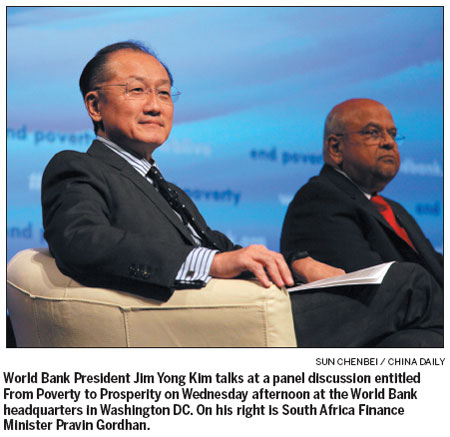WB chief praises China for reforms
Updated: 2013-10-10 09:46
By Chen Weihua in Washington (China Daily)
|
|||||||||||

World Bank president Jim Yong Kim set an interim target on Wednesday to reduce global poverty to 9 percent by 2020. If achieved, it would mark the first time the rate has gone down to single digits.
The target was based on a World Bank analysis of global poverty trends toward reaching a goal set in April of ending extreme poverty by 2030, extreme poverty being people who live on $1.25 a day or less.
According to the World Bank, an end to extreme poverty would mean the poverty level falls below 3 percent globally.
Global poverty has been dropping sharply — from 1.9 billion people in 1990 to 1.2 billion in 2010. The 9 percent target for 2020 would mean that an estimated 690 million people would still be living in extreme poverty.
"Setting this target reminds us we are on the cusp of something historic — ridding the world of the scourge of people living in such abysmal conditions," Kim said on Wednesday on the eve of the opening of the 2013 annual meetings of the World Bank and the International Monetary Fund.
"It also means that all of us developing country leaders and their partners, including the World Bank Group, need to up their game now in order to end extreme poverty," he said.
"We need to help developing countries accelerate growth, attract private investment and create good jobs," he said.
Kim said ending extreme poverty is achievable in less than a generation's time. "But we need strong growth, committed political leaders, and a growing social movement that keeps pushing all of us to focus like a laser beam on the result all of us want," said Kim, who took his current post in July 2012.
Kim also emphasized the bank's shared prosperity goal, which focuses on the bottom 40 percent in each country, saying that ignoring the bottom 40 percent will cause social instability, as seen in the Arab Spring.
China has long been regarded by the World Bank and other international development agencies as a model of poverty reduction. Between 1981 and 2010, some 680 million Chinese were lifted out of extreme poverty.
At the meeting on Wednesday, Kim praised China for its continued efforts in pursing reform despite its economic slow-down. He said China is moving away from an investment and export-driven model to a model based more on consumption and services.
Kim cited the Shanghai Free Trade Zone, where the Chinese are going ahead with a process of liberalization, as an example of the reform.
"There again in the context of slow growth rate, they might pull back and say: ‘Wait a minute, we've got to go back to where we know well,'" Kim said.
"They are not doing that. They're continuing their reforms," he said. "And it's a good lesson for all emerging markets. Now is the time. Now is the time to continue with reforms."
Kim also praised China for its climate change initiatives. The largest greenhouse gas emitter in the world now has incredibly aggressive goals for reducing carbon emissions, such as a 40-to-45 percent reduction in carbon intensity, according to Kim.
He said the World Bank is working with China in mapping out plans to achieve the goal of moving some 300 million people into cities by 2030 in China's massive urbanization program.
The former president of Dartmouth College said China is thinking about a new phase of urbanization.
"They (Chinese) are asking us: Please don't give us mosquito bite solutions. Sit back and say how we should think about urbanization in China as a whole," he said.
And he said that the lessons learned in China can be used in other countries with the same problems. "That's what we're going to do," said Kim.
He said the World Bank is also looking for innovative experience to be applied all over the world. He cited the example of Jack Ma, founder of the Chinese firm Alibaba, as innovative in helping to lift people out of poverty by providing poor people with access to the marketplace.
In just a few years, Alibaba has fostered the creation or growth of over 6 million small businesses, according to Kim, who met Ma during his visit to China last month.
Alibaba now accounts for 60 percent of the 8.8 billion packages mailed inside China last year. Since Alibaba was able to drive logistics prices so low that poor women in remote China can access the domestic and world market, selling their products at higher prices, according to Kim.
Kaushik Basu, senior vice president and chief economist at the World Bank, also praised China for thinking of active programs in helping people in the urbanization process.
But he acknowledged that the last bits of extreme poverty in any country will be very difficult to eliminate because those people are usually in remote areas.
"We are also fully aware of the fact that for some people, you just have to make a transfer (of wealth)," Basu said.
Contact the writer at chenweihua@chinadailyusa.com
Related Stories
Cabinet orders close watch on poverty funds 2013-10-09 07:16
Rich should fight poverty too: Ho 2013-09-26 10:48
Ancient site helps lift thousands out of poverty 2013-09-20 23:57
More disabled lifted out of poverty 2013-09-13 16:52
Reducing poverty gains momentum in Asia 2013-09-12 09:16
Eradicating poverty still important 2013-07-22 08:23
Today's Top News
Invisible cities inspire tuned urbanization
Trending news across China on Oct 10
Foreign banks face hurdle in domestic market
Egypt court announces trial for ex-president
China hits at NASA's conference ban
Wealthy shift focus to investment: Survey
Bo Xilai to appeal life sentence
Premier Li proposes ASEAN plan
Hot Topics
Lunar probe , China growth forecasts, Emission rules get tougher, China seen through 'colored lens', International board,
Editor's Picks

|

|

|

|

|

|





